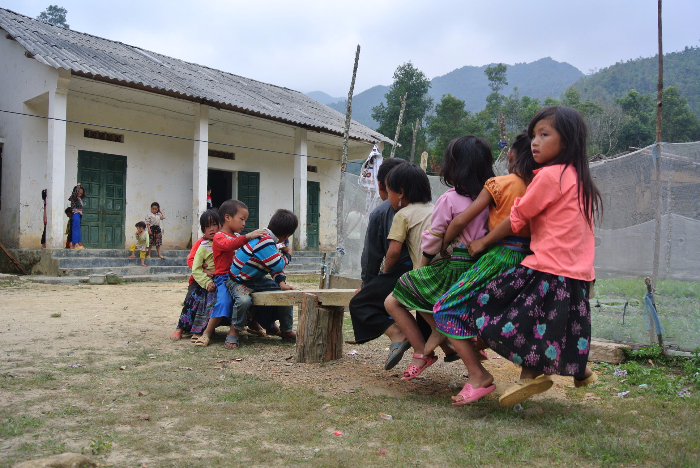The Best Immersion Strategies Learned Only After Getting Fired and Starting Over
In-country immersion isn’t always the answer to learning another language.
I learned this lesson the hard way six months into my stay in Spain, with barely any Spanish to show for it before I changed my approach. Nowadays, I generally recommend people get virtual immersion and learn a language online.
But there is something to be said for time in a foreign country, when you do it right. In today’s guest post Jeremy shares his story and his main lessons learned from a successful immersion experience that followed an unsuccessful one.
Over to you Jeremy!
“I’m going to be honest, Jeremy.” My boss glared into my eyes as I sat down in her office.
I tried to force a smile, but her icy demeanour froze up the entire room.
In her thick Israeli accent she continued, “Conversations like these are my least favourite thing to do”.
My throat sank into my stomach as I waited for what came next.
Like many travellers I had a long list of exotic places I wanted to visit and the things I wanted to do. ”Getting fired in a foreign country” was not one of them.

“You’re Just…. Not Yourself”
I was 22, fresh out of university and ready to take on the world. I had booked a one-way ticket to Israel, where I had landed my dream job as a counsellor for a high school study abroad program.
Not only was I getting fired from that job, I was getting evicted as well, since room and board were a part of my contract.
All because I wasn’t acting like myself.
Something was wrong with me. Everyone noticed it. Except for me.
For the next ten minutes, my boss looked me straight in the eyes and laid out the evidence: I hadn’t made any new friends since I arrived. I lacked excitement. I was too quiet. My Hebrew was pitiful. The list went on.
Finally, I embraced my reality.
I had hit rock bottom.
I was on the other side of the world.
I had no job, no nearby family that could help me, and no idea what to do.
How I Became a VietNomad
“Life isn’t about how hard you can hit. It’s about how hard you can get hit and keep going.” –Rocky Balboa
Three months later, in late 2013, I found myself on another one-way flight. This time to Vietnam.
Immersing yourself in a new country abroad isn’t easy. I learned that the hard way. But this time, success was my only option.
I set off with the same goals I initially had when I went to Israel: be a culture chameleon and blend in as much as possible. When I left, I knew zero Vietnamese. Though, when I got there, I realised it was a tonal language, similar to Chinese and Thai.
I was ignorant. I’d never learned a tonal language before. But I dove in anyway.
I had no cell phone or Internet, roughly five US dollars per day for expenses, no connection to the outside world, and nobody else spoke English.
Ten months later I was a guest on a Vietnamese reality TV show (video later in this article).
At the time, my Vietnamese was weak, probably around an A2. I could communicate what I wanted, but my pronunciation was horrible. I didn’t know the tones. I couldn’t write. I didn’t even know the alphabet. I didn’t own any textbooks, and I didn’t take any lessons. But I had the confidence that comes from reaching an all time low. I thought “No matter how this turns out it won’t be as bad as my experience in Israel.”
While on the show, I started to realise all of the mistakes I had made in Israel that stunted my progress in Hebrew. I figured out why I lost confidence and fell into a state of loneliness and eventually depression. It wasn’t until I was alone around a group of people speaking a strange language that I finally heard myself.
After 25 days living in the Mountains of Vietnam without English, I cracked the code to language learning through immersion. I’m here now to share my experiences and give you the three most important things you need to know about language immersion.
Immersion Tip 1: You Can’t Do It Alone
httpv://www.youtube.com/watch?v=cjh918c_ORY
One of the main reasons I failed to learn any Hebrew in Israel is because I was alone. I had no teacher, no accountability buddies, and no schedule. I lost sight of my goal and lost all confidence. Frankly, I was lonely.
Having a teacher or some sort of support system is a great way to maintain progress and confidence.
This is true for language learning in general, but when you’re doing language immersion, you need other people. You can’t sit at home and study vocabulary words all day. You can’t watch YouTube videos in your target language and keep telling yourself that you’re being “productive”.
You need to get out there and connect with people. You need help, you need accountability, and you need encouragement.
Obviously, having a teacher is a wonderful way to avoid being alone. But, remember to be selective if you’re going to hire a private tutor. Your teacher can teach you more than just the language; he/she will be a cultural bridge between you and your new home. It’s important to choose a teacher that cares about you beyond your language skills.
If you’re like me and you don’t enjoy learning in classroom settings, then you’ve got to surround yourself with a healthy balance of locals and expats.
It’s great to be a culture chameleon and to blend in, but locals can’t relate to your struggles. This can be extremely frustrating at times when they don’t understand what you are going through.

Sure, they can help you out tremendously with your target language, but they’re not familiar with homesickness, culture shock, and many other feelings that come with living in a new place. You need friends that understand what you’re going through.
While I was on the reality show, one of the most frustrating parts was that I was always the stupidest person in the conversation. But being the dumbest person in the room can be a good thing, because it means you can learn from everyone.
I never knew what was going on. I was ignorant about the culture, and I found it close to impossible to communicate my thoughts. It was a constant struggle, because everyone else on the show had been speaking Vietnamese for their entire lives.
As I was still learning the basics: colours, shapes, etc., I constantly felt like an idiot. The others started getting impatient with me, and since I was the only foreigner, none of them could relate to what I was going through.
During a home stay in a minority Hmong village, I finally made some friends that were going through similar experiences. I made some friends that helped me A TON.
They weren’t foreigners. They were local, but their Vietnamese wasn’t too impressive. They were patient and playful. They were just like children…
Immersion Tip 2: Think of Yourself as a Child

Learning a foreign language is like having a second childhood. You get to start over again, and it’s awesome if you do it with the right mentality.
Think of yourself as an adult, and you’re constantly embarrassing yourself. Think of yourself as a child, and it becomes easy and fun.
What kind of grown ups confuse the word for “right” with “left” or “Thursday” with “Friday”? None. But, children do this all the time when they first learn words. No matter how old you are, when you learn a new language you are a child in that language.
For the first few days after I arrived in the Hmong village, I was the scarecrow from the Wizard Of Oz. I had no brain. I was helpless and highly dependent on the others. But after interacting with Hmong kids for a few days, I realised that I didn’t have to be a unintelligent adult. I could be an appreciative and curious kid.
I started focusing on practical language. I started asking questions. I started forgiving myself for all the mistakes I was making.
Like children, as language learners we need to be surrounded by people that care about us. Language learners need to be around people that are willing to help, and most importantly, people that have a lot of patience.
Kids can ask so many questions that it can start to get annoying and exhausting. Don’t let this hold you back. Ask as many questions as possible! Did you forget the word for “cup” already? Ask again. It may be embarrassing at times, but that’s okay. The more embarrassing and nerve racking the situation is, the more likely it is that it will be engrained in your memory.
Children also need breaks. They can’t focus for five hours a time! The same goes for language learners. It can be easy to get caught up in language immersion and not take breaks. After all, language immersion can be as intense as you want it to be.
During immersion, you’re not going to be able to keep up all of the time. But, that’s okay. You’re going to feel lost. But be sure to stay curious. Ask a lot of questions. Mimic the people around you. Even if you’re not sure what you are saying, repeating native speakers trains your mouth, and makes it easier to pronounce words.
If you can, surround yourself with other children! I got along great with the other kids because our Vietnamese was at a similar level. I was still far behind, but they were excited to play with me and teach me Vietnamese, just as you were once excited to show off your imaginary friend to your parents.
Immersion Tip 3: Write About Your Experience

Language immersion leads to the best memories, and it’s never been easier to document your life. The best way to do this is by writing in a journal, which has more benefits than you may realize.
Research shows that writing down your thoughts improves your mood, boosts your memory, and can even reduce cancer symptoms.
Writing is a form of therapy. When you write out your problems, you release steam and become aware of what’s bothering you. When you write down about things you are grateful for, your brain strengthens its neurological pathways, making it easier to feel repeat this process and feel more grateful and happy in the future.
The most vivid memories of the last 10 years of my life stuck because I kept them in a journal. When you write it down, you internalise it and the memory grows stronger.
If you want to go the extra mile, journaling in your target language is one of the best ways to review what you learned that day. This won’t be easy if you are a beginner, but even writing a sentence or two helps a lot. You can bring your journal to a close friend, your host family, or your teacher to help you with your writing as well.
While I was on the reality show, I was required to write in my diary every night. I was suppose to write about the drama and cheesy love story: who I liked, who I was jealous of, etc. But, instead I used it as way to practice my Vietnamese and learn how to read and write.
I wrote a play-by-play of everything we did that day. I’d try to mention as many new vocabulary words as possible. My sentences usually were short and not grammatically incorrect, but my writing got better everyday. I attribute this daily journal for how I retained so many new vocabulary.
This process of recalling vocabulary embedded words in my memory. Plus, with each new word I learned, I had a story that went along with it, since all the words I were learning were introduced through daily life. It was easier than ever to remember these words because they were all connected to real life experiences. I didn’t have to make up a story in my imagination; I had a personal connection with every single word I encountered.
In other words, I had no choice but to memorize new words. I knew I would be tested on these words in the days to come, because they were relevant to my life.
What if you hate writing? You can also keep a photo journal or take videos. Those will help capture memories and stories and help you remember things, but I strongly suggest you keep a journal. It gets a little time consuming, but five minutes a day is worth the amazing benefits it will give you.
Bonus Tip: You Don’t Have to Go On Reality TV to Immerse Yourself in a Language
httpv://www.youtube.com/watch?v=RAsOqEcsHxU
My immersion experience was pretty crazy, and it’s certainly not typical. There are many ways to put yourself in language immersion experiences. You can go on a study abroad program, work in another country, take a vacation do a homestay, or sign up for an adult immersion program.
What if you can’t afford to travel?
That’s fine, too! You can create immersive environments yourself. Imagine how much you’d learn if your TV, cell phone, laptop, and GPS all spoke to you in Spanish!
Never Give Up On Your Dreams
I often get flashbacks to my time in Israel. I was lonely and at an all time low. I once woke up in an alley covered in someone else’s hummus.
I could have given up when I was in Vietnam. I could have lived through that same story. But I made the decision to make the best of it all. I made the decision to be persistent.
Fast forward to spring 2015, and I was living a new dream. This time, in Saigon (Ho Chi Minh City), Vietnam.
My Vietnamese was impressive enough to get me on several local TV shows. I competed in a Vietnamese TV competition. I won a large cash prize doing stand up comedy in Vietnamese.
All of this happened because I spoke Vietnamese.
And the only reason I speak Vietnamese today is because I didn’t give up.
Immersion can be really tough. Whatever you do, never give up on your language learning dreams. When you think you’ve hit rock bottom, keep going. You never know what’s on the other side.
About the Author: Jeremy Ginsburg is a writer and an entreperformer living in Vietnam. Check out his website to claim a FREE copy of his new book, launched this fall. Jeremy also has many hilarious language learning videos on his YouTube channel.



Social